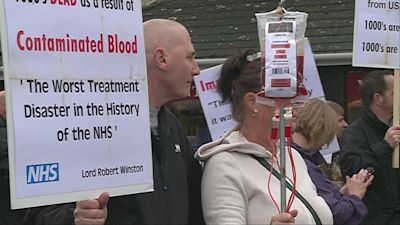Almost 2,000 people died from infected blood, expert inquiry finds

Almost 2,000 people in the UK died after being given contaminated blood transfusions between 1970 and 1991, a report has found.
The new study, published by experts from a number of UK universities, lays bare the damage that the contaminated blood scandal has inflicted on the lives of thousands.
The scandal saw thousands of people with blood disorders given transfusions that gave them HIV and Hepatitis C.
That's because they were receiving contaminated Factor VIII from people who were paid to donate, including prisoners and drug addicts.
Patients were given the product for years despite repeated warnings at the top of government.
Last month, the government agreed to pay compensation to victims - before the conclusion of the current inquiry, set for 2023. Each surviving victim will receive payments of around £100,000 each.
In July, three former health secretaries called for victims to be paid at once, as the effects of contaminated blood are still having a devastating impact on people.
In August, an open letter to the government by organisations including the Haemophilia Society and the Terrence Higgins Trust claimed that an affected person was dying every four days.
Why were people exposed to contaminated blood?
Different groups were exposed to contaminated blood.
One was given regular injections of a treatment designed to help treat haemophilia, a blood clotting disorder. At least 3,650 of those people contracted Hepatitis C or HIV as a result of the botched treatment, with almost half of them thought to have died.
A second group received the transfusions during childbirth, or during surgery. Many of those too fell ill with Hepatitis C.
"I had not dreamed I would still be unwell all these years later," one woman told the inquiry. "Hepatitis C has taken my life and affects my family’s life every day."
"I am increasingly conscious of the fact that my life may be cut short by the ravages that my body has had to endure over the past 5 decades," said another.
"This feeling never goes away. I am aware of my mortality in everything I do."
While the majority of patients for whom data is available fell seriously ill with Hepatitis C, a significant number also became ill with HIV, at a time before the condition could be treated. The reports authors concluded that "around 1,250 people with bleeding disorders were infected with HIV in the UK between 1970 and 1991.
"Around three-quarters of these have died, and around half have died of HIV-related causes"
Past reports have also illustrated the impact that such a diagnosis had on people's lives, even if they survived the illness.
"The day of my diagnosis everything came crashing down," said one victim.
"A big black full stop appeared before me and with it came the stigma of having HIV. I could tell no one, I could not get the answers to life that I sought, I feared touching people in case they found out. I lost all physical contact with the word around me."
What challenges did the report authors face?
It was difficult for the authors of the report to establish definitive numbers of infections and deaths. In part, that's due to the the long periods between transfusion and illness, leading to difficulties in establishing if the transfusion was responsible for the onset of illness.
They write that "any numerical conclusions we draw are necessarily cautious and approximate" describing the process of gathering the data as "particularly challenging".
They added that "We provide no measures of illness, psychological distress, financial harms, family stress, and the many other ways in which infected blood will have damaged lives. In particular, we do not attempt to estimate onward-transmission to partners, children or others."
In total, the study concluded that up to 38,800 people could have been infected after receiving a blood transfusion - arguing a central estimate of 26,800.
A public inquiry has been underway since 2019, when then Prime Minister Theresa May described the scandal as "a tragedy that should never have happened [that] has caused unimaginable pain and hurt for victims and their families for decades.
"The start of the inquiry today is a significant moment for those who have suffered so much for so long, as well as for those who campaigned and fought so hard to make it happen."
Last month, Boris Johnson said: “We will continue to stand by all those impacted by this horrific tragedy, and I want to personally pay tribute to all those who have so determinedly fought for justice.”
The inquiries findings are due to be published in 2023.